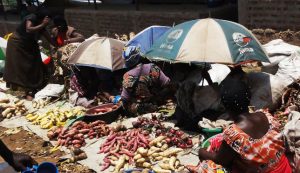 The 2012 report of the President’s Council of Advisor’s on Science and Technology stated that “The U.S. is the undisputed world leader in agricultural production today, but as we look out across the 21stcentury, we face a series of challenges including: 1) managing new pests, pathogens and invasive plants; 2) increasing the efficiency of water use; 3) reducing the environmental footprint of agriculture; 4) growing food in a changing climate; 5) managing the production of bioenergy; 6) producing safe and nutritious food; and 7) assisting with global food security and maintaining abundant yields ”.
The 2012 report of the President’s Council of Advisor’s on Science and Technology stated that “The U.S. is the undisputed world leader in agricultural production today, but as we look out across the 21stcentury, we face a series of challenges including: 1) managing new pests, pathogens and invasive plants; 2) increasing the efficiency of water use; 3) reducing the environmental footprint of agriculture; 4) growing food in a changing climate; 5) managing the production of bioenergy; 6) producing safe and nutritious food; and 7) assisting with global food security and maintaining abundant yields ”.
NC State University is making further investments in agriculture research and a multidisciplinary team of faculty across colleges are galvanizing to solve global food security problems. Led by NC State Professor Jean Ristaino, the NC State Emerging Plant Disease and Global Food Security Chancellors Faculty Excellence Program cluster held a symposium on March 23-24, 2016 at the James B. Hunt, Jr. Library. An international group of approximately 150 scientists studying emerging plant diseases and their arthropod vectors convened at the symposium which featured four sessions with invited keynote speakers, a closing panel and poster sessions.
Managing the threats of emerging diseases that affect agricultural crop plants requires experts in genetics, biology, epidemiology, climate change, metadata analysis, geospatial analytics and global development policy. The ultimate outcomes of this symposium will be to: (a) synthesize new developments on emerging plant disease biology; (b) discuss an expanding array of new technologies to gather, analyze, synthesize; (c) share knowledge about emerging infectious diseases of plants that affect global food security; (d) write a white paper. Kenan Institute resources supported the symposium and help fund graduate student support and other activities of the Emerging Plant Disease and Global Food Security Cluster.
